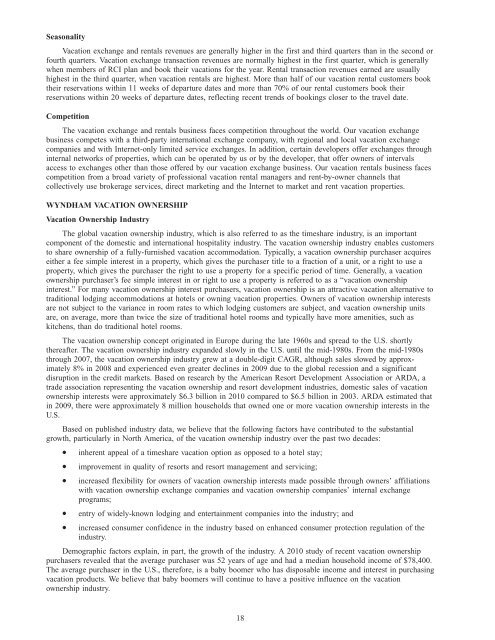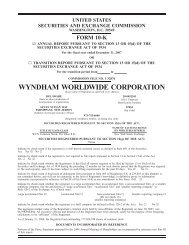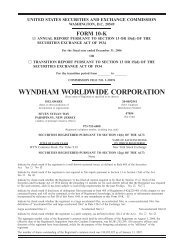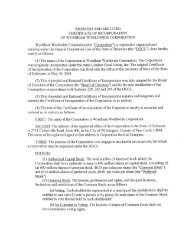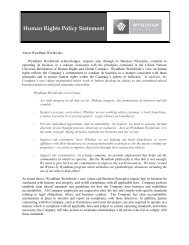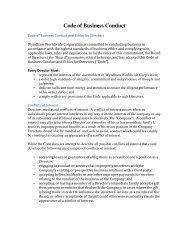WYNDHAM WORLDWIDE CORPORATION
WYNDHAM WORLDWIDE CORPORATION
WYNDHAM WORLDWIDE CORPORATION
You also want an ePaper? Increase the reach of your titles
YUMPU automatically turns print PDFs into web optimized ePapers that Google loves.
Seasonality<br />
Vacation exchange and rentals revenues are generally higher in the first and third quarters than in the second or<br />
fourth quarters. Vacation exchange transaction revenues are normally highest in the first quarter, which is generally<br />
when members of RCI plan and book their vacations for the year. Rental transaction revenues earned are usually<br />
highest in the third quarter, when vacation rentals are highest. More than half of our vacation rental customers book<br />
their reservations within 11 weeks of departure dates and more than 70% of our rental customers book their<br />
reservations within 20 weeks of departure dates, reflecting recent trends of bookings closer to the travel date.<br />
Competition<br />
The vacation exchange and rentals business faces competition throughout the world. Our vacation exchange<br />
business competes with a third-party international exchange company, with regional and local vacation exchange<br />
companies and with Internet-only limited service exchanges. In addition, certain developers offer exchanges through<br />
internal networks of properties, which can be operated by us or by the developer, that offer owners of intervals<br />
access to exchanges other than those offered by our vacation exchange business. Our vacation rentals business faces<br />
competition from a broad variety of professional vacation rental managers and rent-by-owner channels that<br />
collectively use brokerage services, direct marketing and the Internet to market and rent vacation properties.<br />
<strong>WYNDHAM</strong> VACATION OWNERSHIP<br />
Vacation Ownership Industry<br />
The global vacation ownership industry, which is also referred to as the timeshare industry, is an important<br />
component of the domestic and international hospitality industry. The vacation ownership industry enables customers<br />
to share ownership of a fully-furnished vacation accommodation. Typically, a vacation ownership purchaser acquires<br />
either a fee simple interest in a property, which gives the purchaser title to a fraction of a unit, or a right to use a<br />
property, which gives the purchaser the right to use a property for a specific period of time. Generally, a vacation<br />
ownership purchaser’s fee simple interest in or right to use a property is referred to as a “vacation ownership<br />
interest.” For many vacation ownership interest purchasers, vacation ownership is an attractive vacation alternative to<br />
traditional lodging accommodations at hotels or owning vacation properties. Owners of vacation ownership interests<br />
are not subject to the variance in room rates to which lodging customers are subject, and vacation ownership units<br />
are, on average, more than twice the size of traditional hotel rooms and typically have more amenities, such as<br />
kitchens, than do traditional hotel rooms.<br />
The vacation ownership concept originated in Europe during the late 1960s and spread to the U.S. shortly<br />
thereafter. The vacation ownership industry expanded slowly in the U.S. until the mid-1980s. From the mid-1980s<br />
through 2007, the vacation ownership industry grew at a double-digit CAGR, although sales slowed by approximately<br />
8% in 2008 and experienced even greater declines in 2009 due to the global recession and a significant<br />
disruption in the credit markets. Based on research by the American Resort Development Association or ARDA, a<br />
trade association representing the vacation ownership and resort development industries, domestic sales of vacation<br />
ownership interests were approximately $6.3 billion in 2010 compared to $6.5 billion in 2003. ARDA estimated that<br />
in 2009, there were approximately 8 million households that owned one or more vacation ownership interests in the<br />
U.S.<br />
Based on published industry data, we believe that the following factors have contributed to the substantial<br />
growth, particularly in North America, of the vacation ownership industry over the past two decades:<br />
k inherent appeal of a timeshare vacation option as opposed to a hotel stay;<br />
k improvement in quality of resorts and resort management and servicing;<br />
k increased flexibility for owners of vacation ownership interests made possible through owners’ affiliations<br />
with vacation ownership exchange companies and vacation ownership companies’ internal exchange<br />
programs;<br />
k entry of widely-known lodging and entertainment companies into the industry; and<br />
k increased consumer confidence in the industry based on enhanced consumer protection regulation of the<br />
industry.<br />
Demographic factors explain, in part, the growth of the industry. A 2010 study of recent vacation ownership<br />
purchasers revealed that the average purchaser was 52 years of age and had a median household income of $78,400.<br />
The average purchaser in the U.S., therefore, is a baby boomer who has disposable income and interest in purchasing<br />
vacation products. We believe that baby boomers will continue to have a positive influence on the vacation<br />
ownership industry.<br />
18


